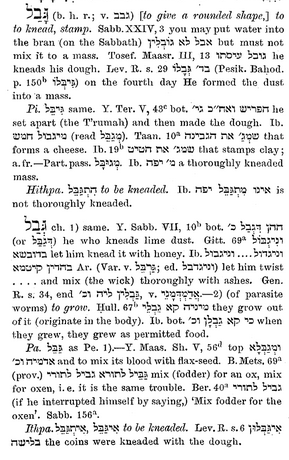In Shemot 13:6-7, in parashat Va'era:
I had the following novel thought. Why specifically "in all your borders"? In the past (meaning Shemot 12:15 and 12:19, it was in your "houses", rather than "borders" that they should not be found:
)
This could very well be just a poetic alternation of "borders" for "houses", both giving the sense of "your domain".
However, the same shoresh can refer to kneading, or to dough. See Jastrow page 207:
If so, we might be able to translate this as:
When you are making dough, you may not add sourdough, so as so make it chametz. You can thus only produce matzah. This makes sense, since for those seven days, שְׂאֹר לֹא יִמָּצֵא בְּבָתֵּיכֶם, no sourdough is to be found in your house in the sense of using it to make chametz.
I had the following novel thought. Why specifically "in all your borders"? In the past (meaning Shemot 12:15 and 12:19, it was in your "houses", rather than "borders" that they should not be found:
| טו שִׁבְעַת יָמִים, מַצּוֹת תֹּאכֵלוּ--אַךְ בַּיּוֹם הָרִאשׁוֹן, תַּשְׁבִּיתוּ שְּׂאֹר מִבָּתֵּיכֶם: כִּי כָּל-אֹכֵל חָמֵץ, וְנִכְרְתָה הַנֶּפֶשׁ הַהִוא מִיִּשְׂרָאֵל--מִיּוֹם הָרִאשֹׁן, עַד-יוֹם הַשְּׁבִעִי. | 15 Seven days shall ye eat unleavened bread; howbeit the first day ye shall put away leaven out of your houses; for whosoever eateth leavened bread from the first day until the seventh day, that soul shall be cut off from Israel. |
| יט שִׁבְעַת יָמִים--שְׂאֹר, לֹא יִמָּצֵא בְּבָתֵּיכֶם: כִּי כָּל-אֹכֵל מַחְמֶצֶת, וְנִכְרְתָה הַנֶּפֶשׁ הַהִוא מֵעֲדַת יִשְׂרָאֵל--בַּגֵּר, וּבְאֶזְרַח הָאָרֶץ. | 19 Seven days shall there be no leaven found in your houses; for whosoever eateth that which is leavened, that soul shall be cut off from the congregation of Israel, whether he be a sojourner, or one that is born in the land. |
This could very well be just a poetic alternation of "borders" for "houses", both giving the sense of "your domain".
However, the same shoresh can refer to kneading, or to dough. See Jastrow page 207:
If so, we might be able to translate this as:
| ז מַצּוֹת, יֵאָכֵל, אֵת, שִׁבְעַת הַיָּמִים; וְלֹא-יֵרָאֶה לְךָ חָמֵץ, וְלֹא-יֵרָאֶה לְךָ שְׂאֹר--בְּכָל-גְּבֻלֶךָ. | 7 Unleavened bread shall be eaten throughout the seven days; and there shall no leavened bread be seen with thee, neither shall there be leaven seen with thee, in all thy dough. |
When you are making dough, you may not add sourdough, so as so make it chametz. You can thus only produce matzah. This makes sense, since for those seven days, שְׂאֹר לֹא יִמָּצֵא בְּבָתֵּיכֶם, no sourdough is to be found in your house in the sense of using it to make chametz.


3 comments:
Biblical and Talmudic usage do not necessarily correspond to each other.
Indeed; Klein says that it's post-Biblical. Of course, all that really means is that it isn't *attested* in the Bible: for all we know it was the most common word the ancient Israelites used to refer to dough. But if it were even potentially the primary meaning, wouldn't the classic commentators have been all over this?
I like the suggestion, though: even if it isn't the primary meaning, the potential secondary meaning adds depth to the passage.
Indeed. Though I think that b.h. In the jastrow entry might mean Biblical Hebrew (though he doesn't give an example).
I don't think most classical commenters would go against Chazal when it comes to a halachic section, especially based on a very rare or unattested usage, compared to how gevul is used commonly in tanach. I wonder also if it would require a revocalization, which would be another barrier.
Post a Comment